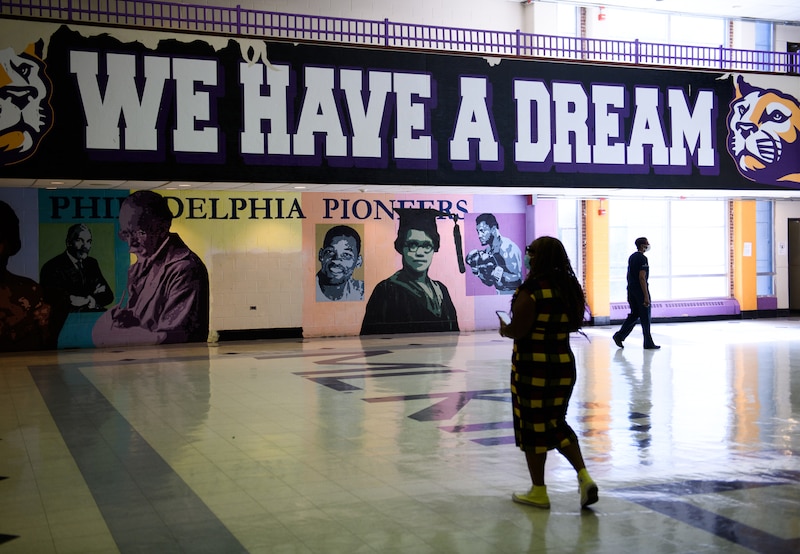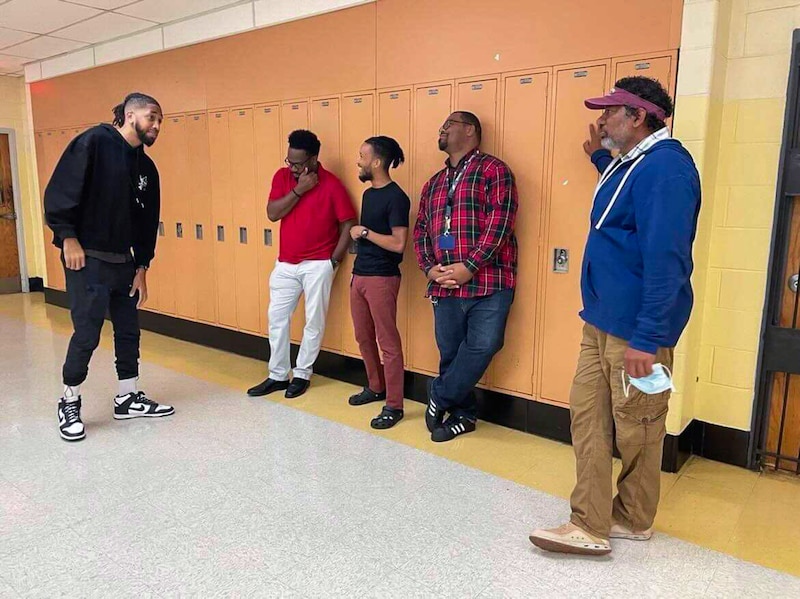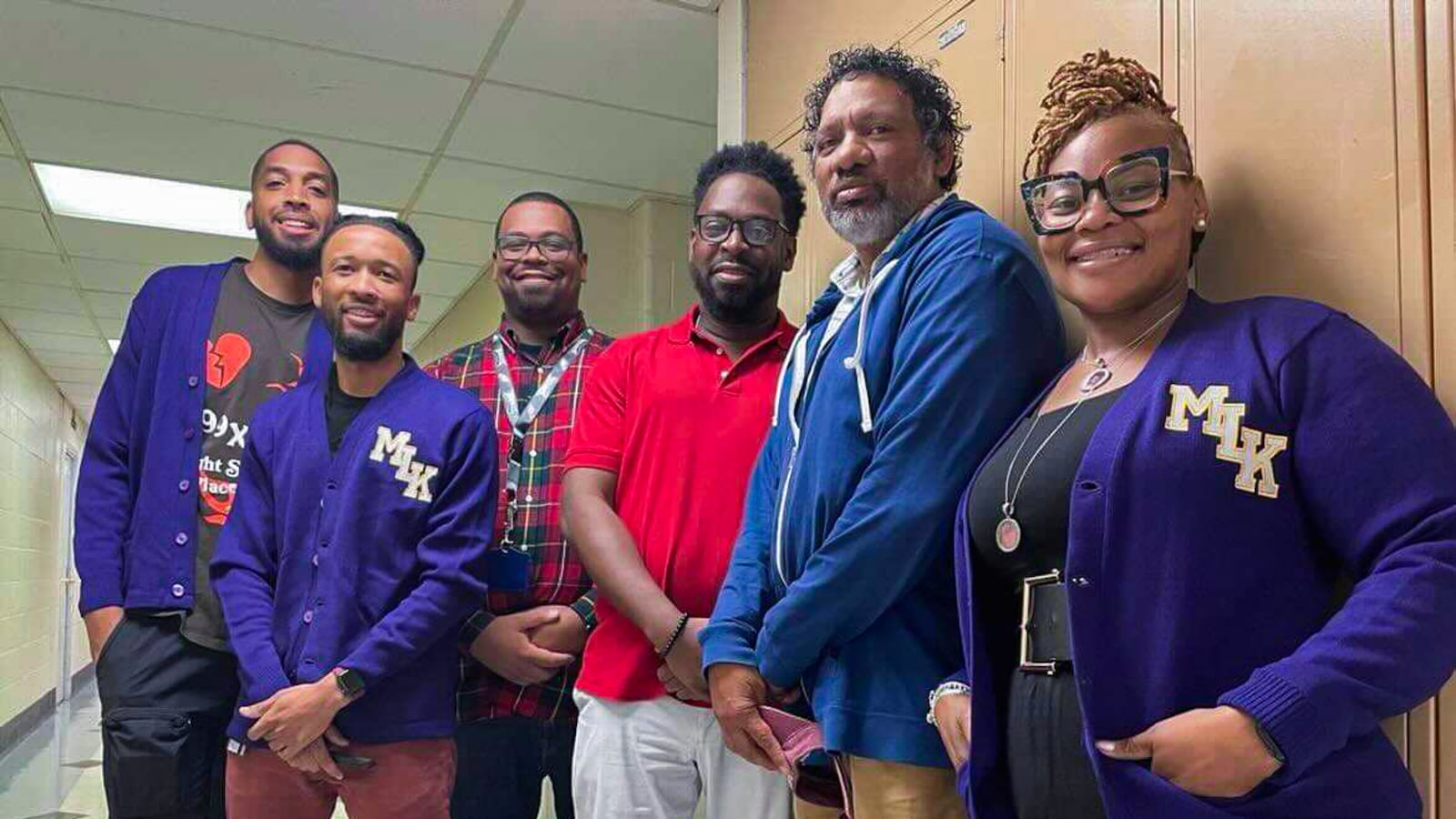Ninth graders at Philadelphia’s Martin Luther King High School are beginning their high school careers with a set of teachers who look like them. That’s something Principal Keisha Wilkins thinks will give the students a boost as they prepare for the future.
In fact, Martin Luther King, where last year the student body was 92% Black and 62% male, has become the first high school in the district to have a class that has Black male teachers for the four core subjects — math, English, science, and history — according to the district.
The four teachers’ journeys to careers in education speak to the challenges the profession faces in recruiting and retaining Black men, who make up only 2% of all teachers nationwide. In the Philadelphia school district, roughly 24% of teachers are Black, and of those, just 4% are men, while just over half the district’s students are Black.
Wilkins helped recruit the four teachers — Eric Butler, Michael Flemming, Denzil Flemming, and Marsalis Chism — because she believes their presence will empower the student body.
“We have students that have gone their entire school career [from kindergarten through 8th grade] and never had a Black male teacher,” Wilkins said. “It’s definitely a space where students are going to see a reflection of themselves.”

Black male teachers become ‘part of the content’
Wilkins got help with the recruiting from Stephen Flemming, a school-based teacher lead at MLK. And he, in turn, had a special advantage with one of the teachers he recruited: Stephen and Michael Flemming are brothers. (They’re not related to Denzil Flemming.)
In addition, all four teachers have known each other from church and the community for some 15 to 20 years. Michael Flemming, who had been teaching at Philadelphia’s Kenderton Elementary School, said as he decided to make the switch to MLK this year in part because of the opportunity to link up with colleagues “I’ve known pretty much my whole life.”
Stephen Flemming said that kind of close-knit support is particularly important for Butler and Chism, the two newer teachers.
“I think having people they’ve known contributes to retention,” he said, adding that, “We’re like-minded in terms of our approach. We are all about seeing, especially, Black and brown children succeed. It’s cool.”
Butler, who teaches environmental science, decided to become a teacher after volunteering with kids, and “it’s been one of the best decisions,” he said. “I feel like I’m really making an impact, even when I don’t see it that day.”
Butler, who is in his fourth year of teaching, came to MLK this year from Thomas Edison High School, a mostly Latino school in Philadelphia. While that was a positive experience, he said, “it’s just a little different” at King and he feels more at home at his new school.
“I understand my kids a little more,” he said. “They’re like me. I get them. I don’t feel like I need to code-switch when I’m talking.”
Michael Flemming, an African American history teacher at MLK, said he didn’t understand how much he would stand out until he got into a classroom full of Black students.
“Once you get up in front of a group of 30 students that look like you, you’re almost like a unicorn,” he said. “The kids look at you differently. ‘Are you from the neighborhood?’ ‘Are you real?’ These are the questions I’ve gotten.”
His students also react positively to seeing a Black male at the front of the classroom. “When they see I have a master’s degree, they’re like, ‘Oh, my goodness,’” Butler said. “When they see themselves in that position, someone who looks like them, someone that represents them, that’s more motivation for them to go on and fight against the stigma that’s against them now.”
What Butler and Michael Flemming have experienced makes sense to Stephen Flemming, who said the “collective struggles and successes” of Black males help them bring different perspectives to the classrooms.
And for the MLK 9th graders, “This may be their first encounter with Black males as teachers, and to have a whole wing of them, I think, is going to be a positive experience for them,” Flemming said.
Having Black male teachers for students to connect with might be especially important for first-year students. That’s because they are going from being the oldest in their school buildings to the youngest, from having just a few teachers to many, and from merely attending classes to realizing they need the credits to graduate, Flemming said.
Not all MLK students have father figures present in their lives, so “you become vicariously their father figure,” Michael Flemming said. “The kids want to know more about you, almost more than the content sometimes. You become part of the content.”
That mindset extends beyond the school building and school hours: Michael Flemming says it’s important to him to do things like show up to watch his student’s ball games and talk strategy with them.
“Developing relationships is a big component of classroom management,” said Michael Flemming. “It’s just constant encouragement. We’re the seed planters.”

Teaching not always their first career choice
But the nationwide statistics indicate that despite the appeal of such relationships, many Black men don’t see teaching as a great fit. In fact, the four Black male teachers in core subjects at MLK all started on different career paths before giving education a try.
Butler, for example, previously worked as a physical therapist after college in part because it seemed like a lucrative career, before deciding he was “bored out of his mind.”
MLK English teacher Marsalis Chism also resisted the idea of being an educator. Though he went to college and knew he wanted to do something to help people, “I was fighting the calling of being a teacher,” he said, because the idea of dealing with different personalities and behavior issues in schools was daunting.
But as with Butler’s volunteering experience, a summer job Chism took working with kids changed his outlook, because he saw how he could deal with those issues. “I love talking to students on the side so I can counsel them,” he said. “Classroom management is actually one of my strengths.”
From MLK Algebra 1 teacher Denzil Flemming’s perspective, “If you can understand the kids, that’s half the job.”
Still, their special roles as Black male educators at the school don’t mean they lose sight of the work’s challenges. There are unhelpful stereotypes, for example, that Black male educators should be disciplinarians, Michael Flemming said.
Denzil Flemming, a former engineer and an immigrant from Trinidad whose background makes him stand out among the four core subject teachers, said he feels as though the students “are not really prepared in math” and stresses that the subject is crucial to everyday life.
“I try to let them know there’s math everywhere,” he said. “If you’re traveling on a plane, you don’t want the guy who’s flying the plane to be at the bottom of the class. People who drive Teslas expect good engineers to build the cars.”
Growing the pipeline for Black men who heed the call
Wilkins said she assembled the team of four core subject teachers through word of mouth, and was intentional about attracting Black men to the school.
“Who better to teach African-American history than an African-American man?” Wilkins said. “A lot of times we forget history begins before slavery,” she said, and teaching young “kings and queens” that their heritage goes back a long way gives them a path to development.
“If you know somebody who can grow somebody, we want them here,” Wilkins said.
Michael Flemming said he wished more undergraduate programs led more people into teaching, and teaching in urban school systems in particular: “I don’t know if high school counselors even push a lot of 12th graders into education.”
At least one organization is trying to change that. Wilkins singled out the Center for Black Educator Development, which aims to get more Black students interested in teaching through the Black Teacher Pipeline Project. The project’s first fellowships were awarded in February to four Black men.
The center’s founder, Philadelphia educator Sharif El-Mekki, aims to bring 21,000 Black students into the teaching pipeline over the next 12 years in 10 communities across the country, including the Philadelphia-Camden area.
While teaching may not have been the four MLK teachers’ first choice, they all said they now view it as a calling.
“You’ve really got to want to do it,” Butler said. “If you’re trying to make an impact, you’ll figure out the younger generation is the most effective way to do that.”

